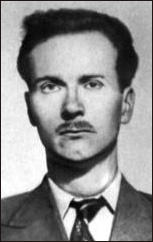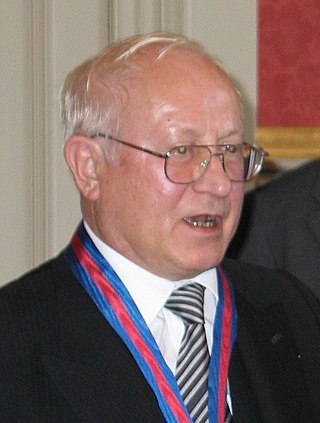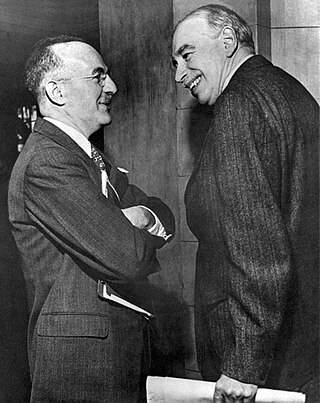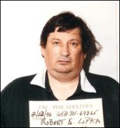Related Research Articles
The Venona project was a United States counterintelligence program initiated during World War II by the United States Army's Signal Intelligence Service and later absorbed by the National Security Agency (NSA), that ran from February 1, 1943, until October 1, 1980. It was intended to decrypt messages transmitted by the intelligence agencies of the Soviet Union. Initiated when the Soviet Union was an ally of the US, the program continued during the Cold War, when the Soviet Union was considered an enemy.

John Cairncross was a British civil servant who became an intelligence officer and spy during the Second World War. As a Soviet double agent, he passed to the Soviet Union the raw Tunny decryptions that influenced the Battle of Kursk. He was alleged to be the fifth member of the Cambridge Five. He was also notable as a translator, literary scholar and writer of non-fiction.

Oleg Antonovich Gordievsky, CMG is a former colonel of the KGB who became KGB resident-designate (rezident) and bureau chief in London. He was a double agent, providing information to the British Secret Intelligence Service (MI6) from 1974 to 1985. After being recalled to Moscow under suspicion, he was exfiltrated from the Soviet Union in July 1985 under a plan code-named Operation Pimlico. The Soviet Union subsequently sentenced him to death in absentia.
Rupert William Simon Allason is a British former Conservative Party politician and author. He was the Member of Parliament (MP) for Torbay in Devon, from 1987 to 1997. He writes books and articles on the subject of espionage under the pen name Nigel West.

Harry Dexter White was a senior U.S. Treasury department official. Working closely with the Secretary of the Treasury Henry Morgenthau Jr., he helped set American financial policy toward the Allies of World War II. He was later accused of espionage by passing information to the Soviet Union.

Alexander Mikhailovich Orlov, was a colonel in the Soviet secret police and NKVD Rezident in the Second Spanish Republic. In 1938, Orlov refused to return to the Soviet Union due to fears of execution, and instead fled with his family to the United States. He is mostly known for secretly transporting the entire Spanish gold reserves to the USSR in exchange for military aid for Spanish Republic and for his book, The Secret History of Stalin's Crimes.

Active measures is a term used to describe political warfare conducted by the Soviet Union and the Russian Federation. The term, which dates back to the 1920s, includes operations such as espionage, propaganda, sabotage and assassination, based on foreign policy objectives of the Soviet and Russian governments. Active measures have continued to be used by the administration of Vladimir Putin.
Operation Trust was a counterintelligence operation of the State Political Directorate (GPU) of the Soviet Union. The operation, which was set up by GPU's predecessor Cheka, ran from 1921 to 1926, set up a fake anti-Bolshevik resistance organization, "Monarchist Union of Central Russia", MUCR, in order to help the OGPU identify real monarchists and anti-Bolsheviks. The created front company was called the Moscow Municipal Credit Association.
As early as the 1920s, the Soviet Union, through its GRU, OGPU, NKVD, and KGB intelligence agencies, used Russian and foreign-born nationals, as well as Communists of American origin, to perform espionage activities in the United States, forming various spy rings. Particularly during the 1940s, some of these espionage networks had contact with various U.S. government agencies. These Soviet espionage networks illegally transmitted confidential information to Moscow, such as information on the development of the atomic bomb. Soviet spies also participated in propaganda and disinformation operations, known as active measures, and attempted to sabotage diplomatic relationships between the U.S. and its allies.

Melita Stedman Norwood was a British civil servant, Communist Party of Great Britain member and KGB spy.
Morgan Goronwy Rees was a Welsh journalist, academic and writer.

The Portland spy ring was an espionage group active in the UK between 1953 and 1961. It comprised five people who obtained classified research documents from the Admiralty Underwater Weapons Establishment (AUWE) on the Isle of Portland, Dorset, and passed them to the Soviet Union.
The "Mitrokhin Archive" is a collection of notes and documents which were secretly made, smuggled, and hidden by the KGB archivist Vasili Mitrokhin during the thirty years in which he served as a KGB archivist in the foreign intelligence service and the First Chief Directorate. When he defected to the United Kingdom in 1992, he brought the archive with him, in six full trunks. His defection was not officially announced until 1999.
Theodore Maly was a former Roman Catholic priest and Soviet intelligence officer during the 1920s and 1930s. He lived illegally in the countries where he worked for the NKVD and was one of the Soviet Union's most effective spymasters.
Dmitri Aleksandrovich Bystrolyotov was a Soviet Russian intelligence officer, a polyglot, a writer and a Gulag prisoner. As a Soviet undercover operative, Bystrolyotov worked in Western Europe between World War I and II, recruiting and controlling several agents in Great Britain, France, Germany, and Italy. His greatest achievement was breaking into the British Foreign Office files years before Kim Philby, as well as procuring diplomatic ciphers of many of European countries. In the 1930s, he fell victim of Joseph Stalin's purges. Arrested by the NKVD on drummed up charges, he was tortured severely. While serving his term, he spent over 16 years in various Gulag camps. There, at great risk to himself, he wrote and smuggled his memoirs to the outside world, which were an indictment of the Communist Party of the Soviet Union's crimes against humanity.
Arnold Deutsch (1903–1942?), variously described as Austrian, Czech or Hungarian, was an academic who worked in London as a Soviet spy, best known for having recruited Kim Philby. Much of his life remains unknown or disputed.
Arthur Henry Ashford Wynn was a British civil servant, social researcher, and recruiter of spies for the Soviet NKVD.

Robert Stephen Lipka was a former army clerk at the National Security Agency (NSA) who, in 1997, pleaded guilty to conspiracy to commit espionage and was sentenced to 18 years in prison. He was arrested more than 30 years after his betrayal, as there is no statute of limitations for espionage.
Russian espionage in the United States has occurred since at least the Cold War, and likely well before. According to the United States government, by 2007 it had reached Cold War levels.
Desmond Patrick Costello was a New Zealand-born linguist, soldier, diplomat and university lecturer and professor who has been accused of being a KGB agent.
References
- ↑ Western Morning News, 7 May 1943, p. 1, and 6 April 1940, p. 1.
- ↑ London Gazette Supplement, 8 January 1942, p. 176.
- 1 2 3 4 5 6 7 8 Obituary, The Times, 31 August 1995.
- 1 2 3 4 Robin Wight, The Independent, 31 August 1995.
- ↑ Tory, The Oxford & Cambridge Journal, Oxford and Cambridge Carlton Publications, No. 1, October 1964, p. 3; Private Eye, No. 928, 11 July 1997, p. 7, and No. 929, 25 July 1997, p. 14.
- 1 2 3 4 Wolfgang Saxon (30 August 1995). "John Costello, 52, Who Wrote of War, Espionage and Mores". New York Times. Retrieved 3 April 2023.
- ↑ Andrew Boyle, The Mask of Treachery, jacket quotation.
- 1 2 Martin Walker, “The Cloud of Treason Descends upon Another Bastion of British Respectability”, Los Angeles Times, 12 July 1992.
- 1 2 3 Nigel West, “Obituary: Oleg Tsarev”, Spear’s Magazine, 20 October 2009.
- ↑ Christopher Andrew and Vasili Mitrokhin, The Mitrokhin Archive: The KGB in Europe and the West, Allen Lane, London, 1999, p. 749 at n. 62.
- ↑ Rosamund Thomas, Espionage and Secrecy, The Official Secrets Acts 1911-1989 of the United Kingdom, Routledge, Abingdon, 2016, p. 230.
- ↑ David Connett, “Tell-tale spy the British want to keep in the cold”, The Independent, 12 June 1993.
- ↑ Andrew and Mitrokhin, p. 26.
- ↑ Andrew and Mitrokhin, p. 29.